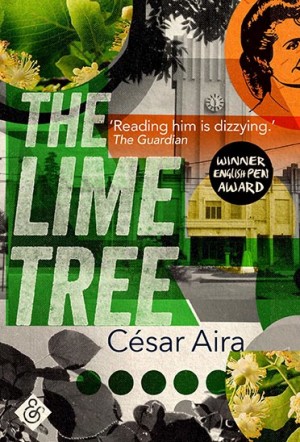We are delighted to reveal that the inaugural title for the Asymptote Book Club, as chosen by our editorial team, is César Aira’s The Lime Tree. Aira has previously been a Man Booker International finalist, and translator Chris Andrews received the Valle-Inclán Prize for his English version of Bolaño’s Distant Star. The Lime Tree is published by not-for-profit translation champions & Other Stories.
On January 2, 2018, we will be launching our members-only online discussion space where subscribers can talk about César Aira’s The Lime Tree. An interview with translator Chris Andrews will also be posted on the Asymptote blog shortly thereafter. In the meantime, we invite you to tweet about your first reactions on social media using the hashtag #AsymptoteBookClub!
For more on the newly launched Asymptote Book Club, or to start your subscription in January 2018, see details here. We’re already preparing the next exciting title, so don’t delay!
For those curious about this month’s book club selection, here below is a review by former executive assistant Emma Holland.
The Lime Tree by César Aira, translated from the Spanish by Chris Andrews, And Other Stories (UK)
Reviewed by Emma Holland, Asymptote guest contributor

The Lime Tree is the latest novel by the prolific Argentine writer César Aira to be translated into English. It opens with memories of ten thousand lime trees that fill the Plaza of the town of Pringles—and one enormous, awe-inspiring Monster Lime Tree, filled with “all the exotic majesty of the unique.” The narrator thinks back to how his insomniac father would collect the little flowers from this tree to make a calming tea. Aira then proceeds to take the reader on a story of this small town, beginning first with the Peronist politics that informed many of the memories of the narrator’s childhood. One evening, the majestic tree is cut down in an act of political hatred when a boy from a Peronist family seeks refuge at the top of the tree, echoing the story of the book Sambo, and later haunting the narrator—“my whole life has taken on the unreal colour of that fable; since then I have never been able to find a footing in reality.”
With Aira’s clever style, it seems that The Lime Tree teeters on the edge of reality. The novel hints at magical realism with the infamous tree, uses charming anecdotes to reflect upon society, quickly delves into the lives of the town’s characters before changing course again, and winds through different stages of the narrator’s childhood—all in continuous flowing copy in this short 106-page novel. As a reader, you’re drawn into this world that, while fiction, could well be a portrait of Aira as a boy.
Early on, we meet the narrator’s parents—a quick-tempered father whose obvious physical beauty was cancelled out by the social stigma of his dark colour, and his mother, who was from a respectable white middle-class family, yet possessed a physical deformity and “grotesque” looks. We learn about the narrator’s family at a time of great social change, and how after they found themselves on the losing side of the Revolución Libertadora, they resided on the edge of town, occupying a single room in a massive house—“we had plenty of space, but with the proud dignity of the poor we scorned it,” the narrator muses. The family home was filled with the sounds of the radio or the constant chattering of the mother, meant to calm the father’s nerves.
Even town gossip and childish games created out of boredom seem to strike meaningful reflections. In one game that the narrator creates, he runs ahead of people walking behind him so that they’ll be confused as to how he got ahead so quickly, therefore distorting their view of time. As an adult, he reflects on how such a ploy is only an allegory: “It could serve as a diagram to illustrate the aspirations of young people in small towns. All the fantasies of escape, success and return conform to the same basic scheme; they all revolve around the transmutation of the inquisitive hometown gaze.”
Just as this game reflects broader outlooks, throughout the novel Aira cleverly questions ideas surrounding class, race, image, time and social status. As we weave through different memories, the narrator questions his shaky sense of time, and suddenly the novel ends right back at the Plaza amongst the lime trees where the narrator reflects upon the nature of time and a nostalgia for his younger self.
Read more from the Asymptote archive:

